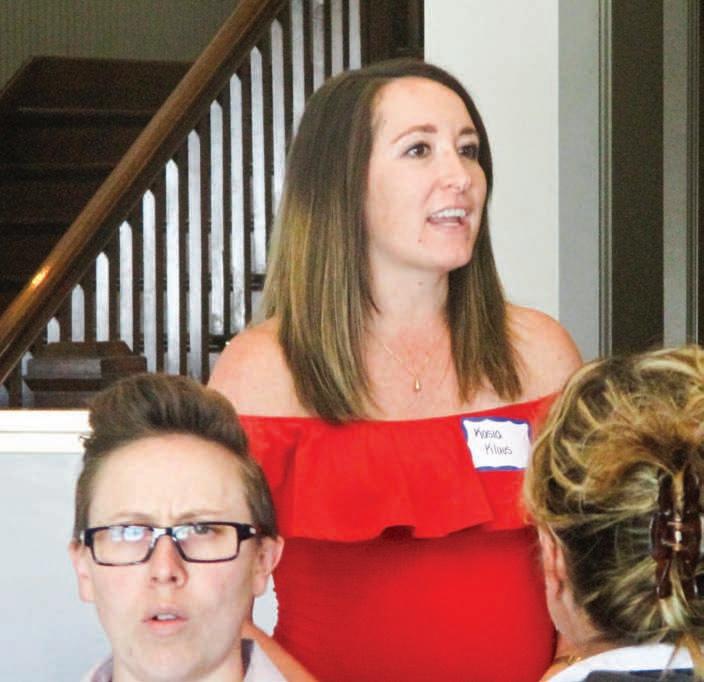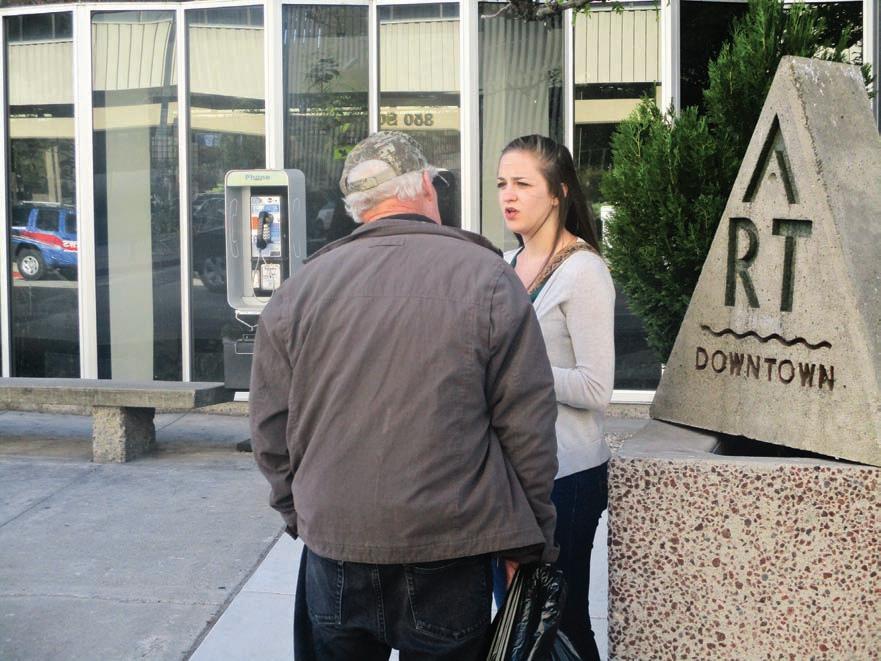
7 minute read
NEWS
from June 7, 2018
Somber comic
The Las Vegas concert shooting has become the subject of a 336-page comic book.
Advertisement
Where We Live includes the work of 19 artists and was edited by Wendy and JH Williams. It is described by the publisher, Image Comics, as “both fictional stories and actual eye-witness accounts. … [It includes] a variety of perspectives with key themes exploring gun violence, common sense gun control, value of a compassionate society, mental health stigmatization, aftermath of tragedy and how individuals and communities persevere and an appreciation of Las Vegas as a vibrant community.”
The artists donated their time and talent, with money raised going to survivors and their families. A spokesperson for Omega Frog Comics in Sparks said their first shipment has sold out, but they have another shipment on order. It was shipped first to comic book stores and was released into regular book stores on June 5.
Public landS debate
Billionaire Sheldon Adelson’s Las Vegas Review Journal has editorialized that Nevada’s federally managed land holdings should be reduced to fuel development.
The editorial read in part, “The inherent tension between those who live, work and recreate on or near government property and those who oversee the federal real estate portfolio—many of whom sit 2,500 miles away in comfortable Beltway offices—fuels the so-called ‘sagebrush rebellion.’ Nevada lawmakers have, from time to time, passed resolutions urging the feds to transfer portions of those holdings to the state or private interests. Not only would that provide for more local management, it would boost the state’s economic development efforts, particularly in rural areas. … At issue, here, is less than seven-one-hundredths of 1 percent of the federal land within Nevada’s boundaries. Clark County’s proposal makes eminent sense from an economic development standpoint.”
In 2016, a Colorado College survey, now in its sixth year, found that 52 percent of Nevadans oppose transferring control of public lands to state or local government or private parties, with 39 percent supporting the idea.
HeadlineS
Mountain West Conference website: “Nevada is the King of the Mountain in Men’s Basketball.”
NCAA website: “Eric Musselman believes next year’s Nevada squad could be the best basketball team in program history.”
Slate: “Cody of Caleb? How to Tell Nevada’s Twin Basketball Stars Apart.“
Coloradan: “How Nevada basketball jumped to top of Mountan West.“
Reno Gazette Journal: “Is everybody overrating the Nevada basketball team?“
—Dennis Myers
Not ready for prime time: Kasia Klaus, an anti-sex trafficking leader, declined to be interviewed.
Rural and urban
Prostitution gets a burst of publicity
efforts are underway in two small Nevada counties to outlaw brothels by ballot petition. The effort is using a slogan of “No little girl grows up wanting to be a prostitute.”
But at a meeting of the Nevada Women’s Lobby in Reno this week, anti-sex trafficking figure Kasia Klaus told the group of occasions when it was necessary to tell underage girls, “You can’t volunteer to be a prostitute. … You can’t choose to be a prostitute as a minor.”
There’s a scene in a West Wing episode when a women’s rights lobbyist tells a White House staffer, “Prostitution is about the subjugation of women by men for profit.”
“But the profit goes to the women,” the staffer says.
The program treated that statement as settling the argument and foreclosing further discussion. In the Nevada petition drives, the saying is misleading, since it is illegal for underage girls to work in the brothels in the first place.
The petition drive is having an effect, however. If there was anyone unaware that small county brothels operated in Nevada, there is a good chance they are now informed. Publicity has been heavy and circled the planet. So it has been a godsend to the industry.
Brothel operator Dennis Hof told the London Guardian, “This is totally politically driven. This is the Mormon mafia in the political establishment trying to throw me off my game while I’m running for office.”
There is no evidence that members of the Church of Jesus Christ of Latter Day Saints have an outsized role in the petition drive, nor did Hof offer any. But it is true that the two targeted counties are Lyon, where he owns all four brothels, and Nye, where he owns two of four. Now a Republican, he is running a second race against GOP incumbent James Oscarson two years after losing against Oscarson as a Libertarian. This is not a race that started out polite and then went negative. Hof opened his campaign with a harsh full-page ad in the Pahrump Valley Times. But whether the antibrothel campaign is directed specifically at him and his political ambitions is unproven.
The dependence of some counties on brothel fees has gotten a reputation for exaggeration, but there have been no independent studies of the question. Nye County’s 2018 budget was $36.5 million. According to the Nevada Independent, its brothel fees were $141,779, which would be well under a percentage point of county revenues.
Nevada prostitution is often misunderstood, starting with where it takes place. It is illegal in most of the state, including both of the urban areas. It is possible in 10 of the state’s 17 jurisdictions, but there are brothels in just nine. In Nye and Lyon, petitioners have been having difficulty getting the signatures they need and have undertaken door-todoor efforts.
A common misconception is that, as the National Catholic Register recently reported, “in 1971, the state legalized prostitution for counties below 700,000 persons.” Actually, the legislature has never affirmatively enacted legalization. Rather, it made prostitution illegal in some regions and left the law silent on the rest. Because it is not illegal, that leaves it up to those jurisdictions— all rural—to decide for themselves.
The Register defined a “descent from virtue to vice” as being the trip from St. Mary’s in the Mountains Catholic Church in Virginia City down Route Two and U.S. 50 to Hof’s Moonlite Bunny Ranch.
The group Klaus represents, Awaken of Reno, is a faith-based group that draws support from several church groups. Awaken’s Melissa Holland was originally scheduled to speak at the Nevada Women’s Lobby luncheon, but she failed to appear and sent Klaus in her place. Holland’s appearance had been announced by the NWL as a talk on “the sex trafficking epidemic in Reno and Awaken’s mission to increase awareness and education surrounding commercial sexual exploitation. So far, Awaken has helped to restore
nearly 400 women in Reno to their fullest potential.”
We intended to ask Holland—or Klaus—to define the epidemic, since it has not received such a description in most news coverage or public agency announcements. But Klaus said she was not allowed by Holland to represent Awaken or to respond to questions. An Awaken handout at the meeting read in part, “In Northern Nevada, there are 1,500 women and children being sold online for sex each month.” No source was given.
In her speech to the Lobby, in which she represented Awaken and answered numerous questions, Klaus said in order to be a victim of sex trafficking, “you just have to be sexually exploited.”
The group’s focus is in Northern Nevada and the Reno urban area, where prostitution is illegal. Klaus said this “doesn’t mean we don’t help women in the brothels.” Some anti-sex trafficking figures argue that most prostitution takes place not in brothels but in the urban areas.
Klaus said Awaken provides case management, therapy and support with schooling, jobs and housing. She said the group does not seek any control over its clients’ funds, saying to do so would be too close to the role of pimps. She also said “more men are stepping forward” to complain they are being trafficked.
She said prostitutes do not hang out in “back alleys” anymore, but when they are asked “Where are you guys hanging out?” they answer “McDonald’s, the mall, Starbucks.” One NWL member said later that prostitutes have never hung out in Reno back alleys, but on Fourth Street or in the casinos.
Supporters of prostitution, who are critics of the anti-sex trafficking movement, tend to lump sex trafficking and willing prostitution together. Paradoxically, Klaus did the same thing. The language she used was sweeping. She did not distinguish between those who choose prostitution and those who seek to get out. She applied the term “sex trafficking” to all prostitution.
In Prostitution Policy (2002), Lenore Kuo wrote, “It is clear that the legalized brothel system in Nevada not only does not ‘normalize’ prostitution but actively enforces official and unofficial regulations that disempower and further stigmatize prostitutes. As [UNR prostitution scholar Ellen] Pillard accurately and succinctly stated, it is a policy of ‘accepting prostitution, rejecting prostitutes.’”
That kind of subtle view tends not to be embraced by either prostitution supporters or sex trafficking opponents. Ω
To contact Awaken, use info@awakenreno.org or call (775) 393-9183. For highly detailed information on the business of Nevada brothels, go to https://tinyurl.com/ybukvekl.
Civic duty
At the Washoe County Library while voting and an RN&R-organized candidate forum went on inside, Christi Cabrera gathered signatures on an initiative petition. It’s that time of an even-numbered year—lots of petitions are being circulated.











